Best coffee for cold brew. Coffee lovers rejoice! Whether for a refreshing morning pick-me-up or to fuel up for a long day of work, you can now find the best beans for cold brew coffee. This blog will explore different ways of making the perfect cup of cold brew and the best coffee. So grab your French press, and pour yourself a cup—it’s time to get this caffeine journey brewing!
What is Cold Brew
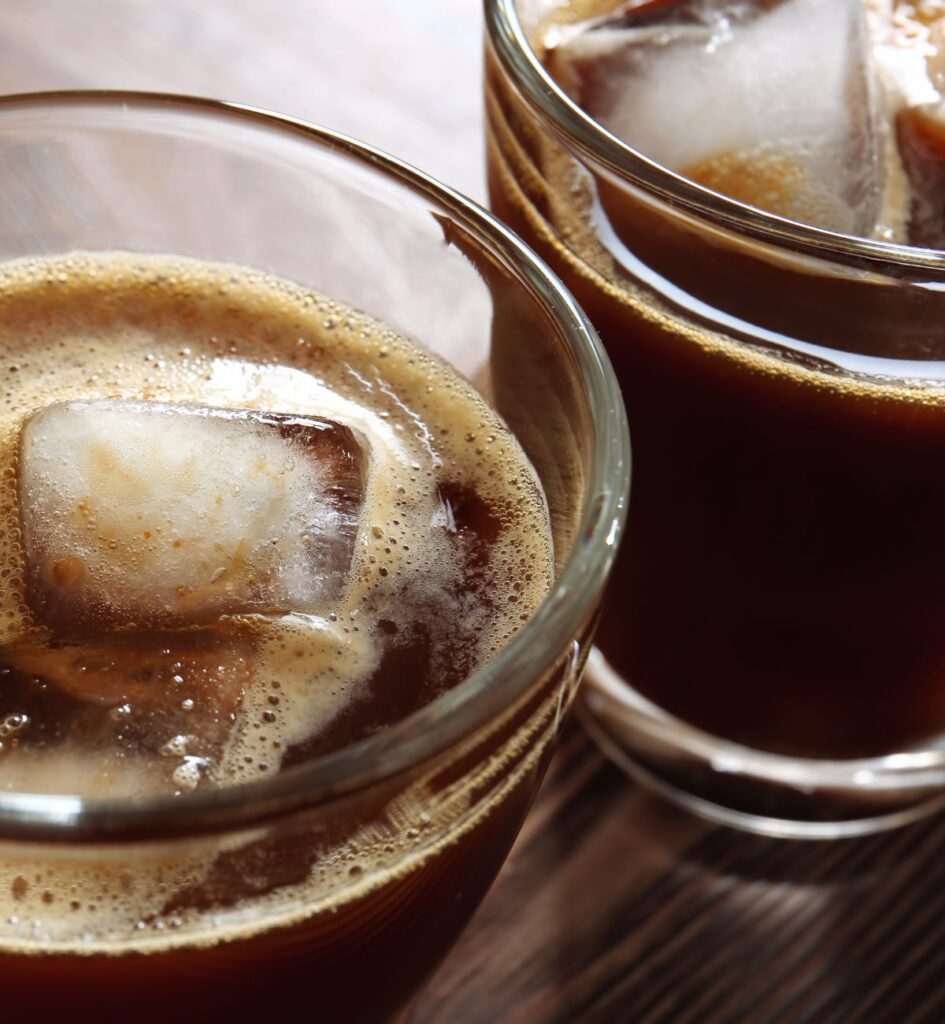
Cold brew is a coffee brewing method achieved by using grounds in cold or room temperature water for an extended period, usually 12 hours or more. As the coffee steeps, the flavors extracted from the coffee beans eventually dissolve into the water creating a rich, smooth concentrate. Once this process is complete, the concentrate can create drinks like iced coffee and nitro cold brew. Alternatively, it can be blended with other ingredients like dairy products or added to cocktails or desserts to add flavor and texture.
Given its long steeping process and lack of heat, cold brew coffees tend to have lower acidity levels than other hot brewed coffees. This makes them ideal for those who may be sensitive to acidic beverages or who prefer a smooth cup of java without too much bite. Additionally, cold brew coffees tend to retain some of their natural sweetness and nutty notes, making them a favorite among specialty coffee enthusiasts.
Types of Coffee for Cold Brew
Cold Brew coffee is a liquid concentrate made by steeping coarsely ground beans in cold water for an extended time. This method produces a smoother cup of coffee than traditional hot brewing methods, with lower acidity and a mellow flavor. Cold brew can be enjoyed both hot and on ice.
When selecting a type of coffee for cold brew, it’s important to look for medium to dark roast beans with a good body and low acidity. Light or medium-light roasts tend to lack the proper body for cold brew, while dark roasts can be too bitter or sharp tasting. Look for coffees that have flavors that will come through in the cold brew, such as chocolate, nuts, spice, and citrus notes.
Here are some great varieties to consider when selecting your perfect cup of Cold Brew:
– Sumatra Mandheling: A full-bodied, light roast with sweet and earthy tones.
– Guatemalan Antigua: A milder light roast with strong chocolate notes, mild sweetness, and subtle spice flavors.
– Ethiopia Yirgacheffe: A medium roast with bright acidity, complex berry flavors, sweet floral undertones, and a pleasant peach finish.
– Brazil Cerrado: A dark roasted espresso blend with a heavy body, intense caramel sweetness, and round chocolate flavor notes.
Best coffee for cold brew
Making the best cold-brewed coffee starts with selecting the right beans. Depending on your taste, you’ll find many coffee beans that are perfect for cold brewing. From light to dark roasts, there is no right or wrong answer when it comes to choosing a roast.
Light Roast Coffees: Light roast coffees generally have bright and lively flavors that can add sweetness and floral notes to your cold-brewed coffee. Examples include Americano, City, Espresso Blonde, White Velvet, and High Mountain Blend.
Medium Roast Coffees: These coffees have a medium body flavor with subtle chocolate and nutty tones. Great examples of a medium roast are Breakfast Blend, French Roast, and Timor Leste Coffee from Indonesia.
Dark Roast Coffees: For those who prefer bolder flavors in their coffee, dark roasted coffees produce strong, hearty flavors in cold brews that have an earthy overtone. Popular dark roasts for cold brew include Colombian Supremo, Dark Italian, and French Roast Sumatra Rouge Blend from Indonesia.
Decaffeinated: Don’t worry; you don’t have to sacrifice flavor for caffeine-free brewing! Decaffeinated coffees still provide rich flavors that mimic the original caffeinated version of the bean. Try decaf options such as Swiss Water Process Medium Dark Colombia or Organic Decaf Peru Blend for satisfaction without the buzz!
Our List of Best Coffee for Cold Brew
1. Best coffee for french press cold brew (Stone Street Cold Brew Coffee, Strong & Smooth Blend)
2. Best medium roast coffee for cold brew (Bizzy Organic Cold Brew Coffee | Smooth & Sweet Blend)
3. Best light roast coffee for cold brew (Copper Moon Guatemalan Antigua Blend, Light Roast Coffee)
4. Best decaf coffee for cold brew (Verena Street, Swiss Water Process Decaf Beans, Sunday Drive Decaffeinated)
5. Single-origin coffee for cold brew (Wink Coffee Cold Brew Reserve Whole Bean Coffee, 100% Arabica Coffee Beans)
6. Best organic coffee for cold brew (Tiny Footprint Coffee USDA Organic Cold Brew & Press Elixir)
7. Best cheap coffee for cold brew (Cold Brew Organic Coarse Ground Coffee, Colombian Supremo)
8. Our pick of the best coffee for cold brew (Coffee Bros., Cold Brew Blend – Whole Bean – 100% Arabica)
Best Coffee for Cold Brew
The best coffee beans for cold brew will keep their strong character after brewing. To know if a particular roast is best for cold brew, look at the bag for the flavor profile, origin, and roast type.
Best coffee for french press cold brew
Stone Street Cold Brew Coffee, Strong & Smooth Blend
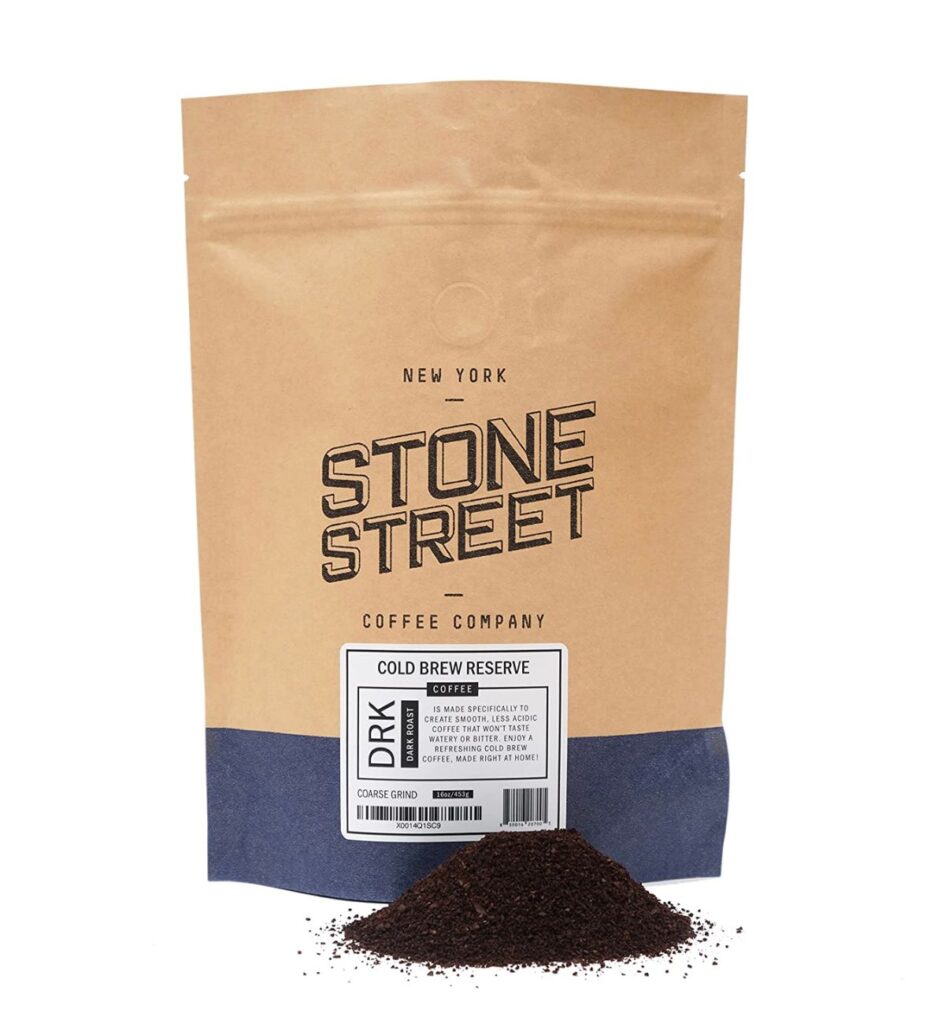
Stone Street Cold Brew Coffee is the perfect blend of strong and smooth flavors that will satisfy even the most discerning coffee connoisseur. This cold brew is made with 100% Arabica beans that are freshly roasted before packaging to guarantee the freshest and richest taste.
Stone Street’s blend is specifically designed for french press brewing, unlike other cold brews. The grind of the beans and the amount of time used to steep are perfectly tailored to create a delicious cup of cold brew every time.
It is a roast that has been ground due to the coarse grind technique, and the Stone Street Coffee Cold Brew Reserve is a dark roast. It’s one origin and Colombian Supremo, slightly sweet and smooth, and it’s a great starter for a cold brew experience.
Pros
- Low acid, which helps prevent stomach irritation for those with a sensitive stomach.
- 100% Arabica beans provide a smooth taste and aroma.
- Coarse grind ensures that the coffee is full-bodied and flavorful.
- Gourmet quality makes it an excellent choice for special occasions or daily consumption.
Cons
- Little bit expensive.
- Not suitable for those who are looking for lower caffeine.
Best medium roast coffee for cold brew
Bizzy Organic Cold Brew Coffee | Smooth & Sweet Blend
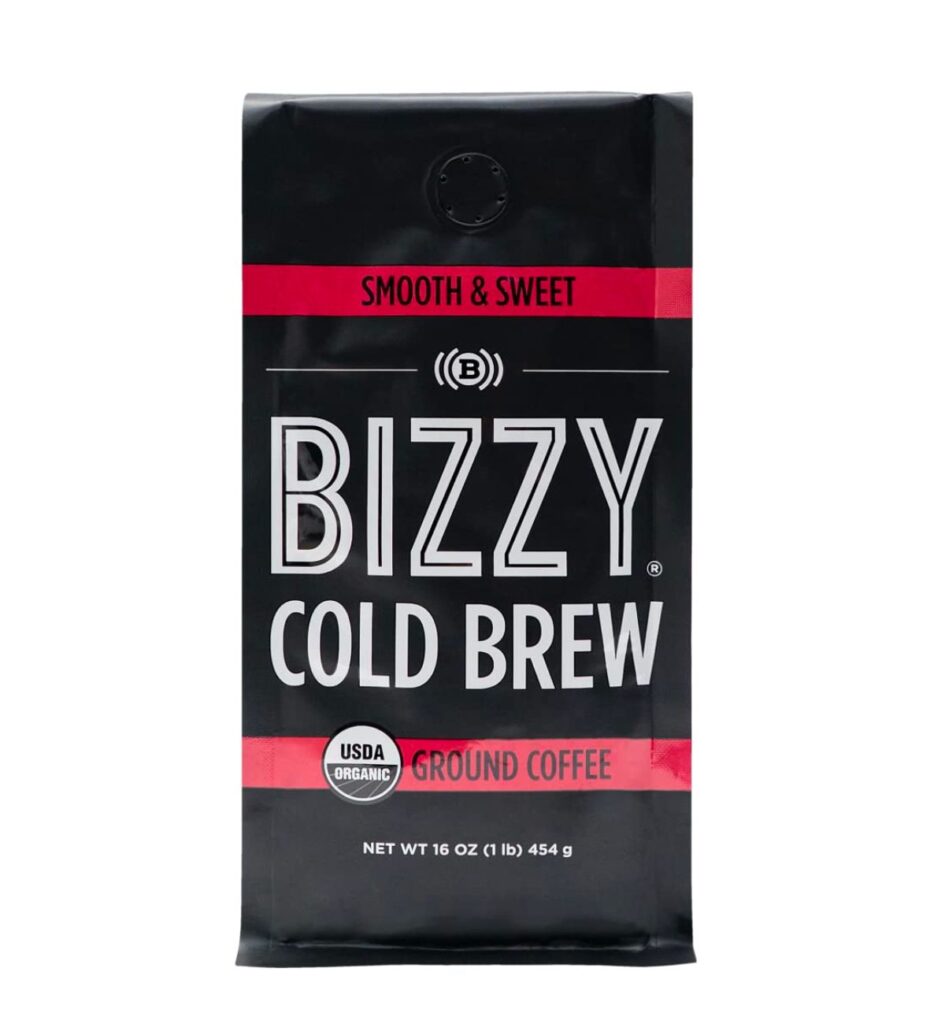
Bizzy Organic provides high-quality medium-roasted coffee beans that have been coarse ground, so they’re perfect for brewing cold brew. Bizzy offers an outstanding selection of flavors for your cold brew, from mild to those which are a bit more powerful.
They roast the beans and use 100% single-origin coffee sourced from Guatemala, Peru, and Nicaragua. They also have consistent testing processes to ensure the product is chemical-free. Bizzy’s intense passion for cold-brewed coffee is clearly visible in the ways it provides its products. It has spent thousands on research and development to develop the perfect coffee grounds and flavor profiles for coffee-to-milk drinks.
Bizzy Organic is always looking for better ways to apply the cold brew process so you can have the smoothest, most delicious cup of coffee possible. So if you want some high-quality coffee grounds for cold brew, be sure to visit Bizzy Organic! You will be satisfied with the quality of their coffee beans the next time you make iced coffee.
Pros
- Made with USDA-certified organic ingredients.
- Coarse-ground beans provide a bolder, richer flavor.
- Micro-sifted for a smooth blend with no sediment.
- Sweetened with natural cane sugar for a subtle sweetness.
Cons
- Limited availability in stores.
- Limited flavor options.
Best light roast coffee for cold brew
Copper Moon Guatemalan Antigua Blend, Light Roast Coffee
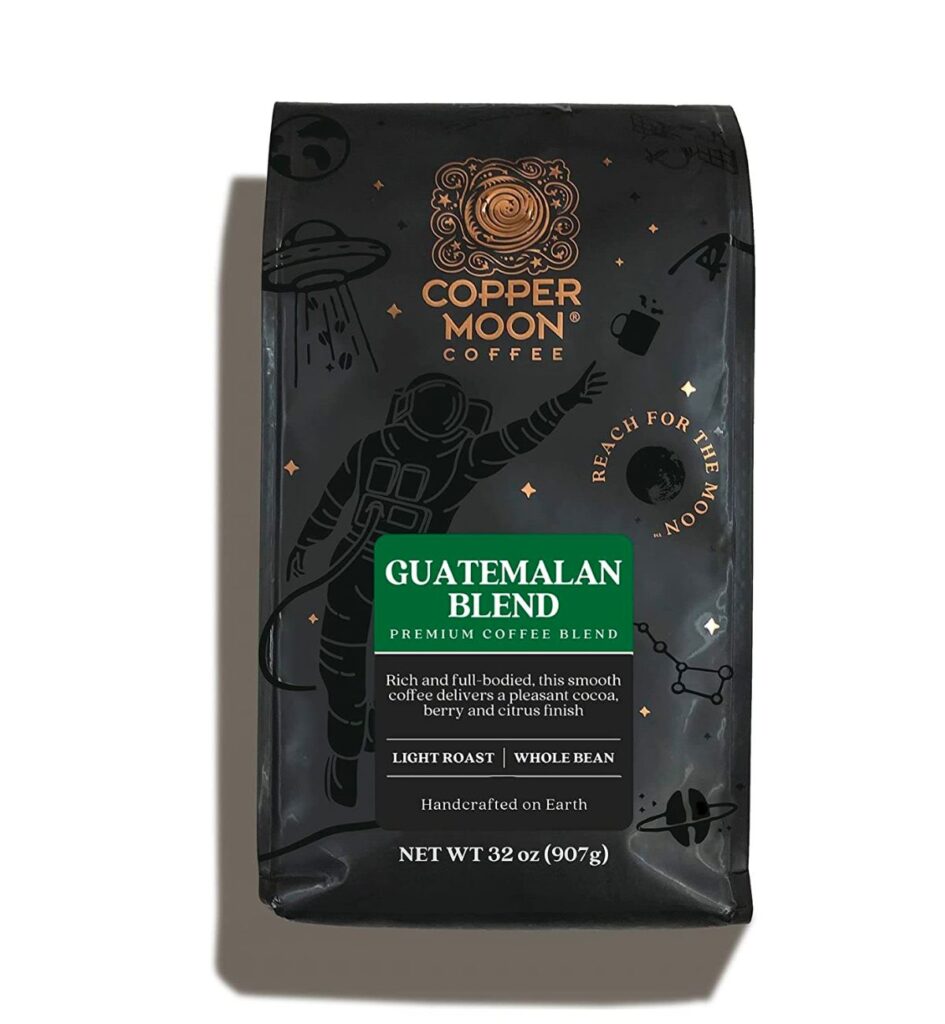
A little floral Guatemalan coffee is famous for making a great cold brew. It is possible to roast the beans in numerous ways, including light for a more fruity flavor or dark for a more sophisticated taste. In the case of cold brew, a dark roast of Guatemalan floral coffee will help you create a more enjoyable drink.
Guatemalan coffee is known for its high-quality beans, grown among beans at high altitudes. Guatemalan coffees have a unique aroma and flavor and are usually full-bodied and moderately acidic.
Guatemala produces a vast amount of coffee annually, and factors like soil quality, sunlight, and rainfall in an area of Guatemala can affect the taste of various Guatemalan roasts. Nevertheless, there are many excellent options for high-quality, tasty Guatemalan coffee. One of the finest is Copper Moon Coffee’s Guatemalan Antigua Blend.
Pros
- Rich flavor with a nutty finish.
- Light roast for a smooth taste.
- Whole bean for freshness.
- Fairly traded from Guatemala.
Cons
- Higher price than other coffee brands.
- Strong flavor may not suit all palates.
- Roasts may vary in strength and flavor profile.
- Sold in only one size.
Best decaf coffee for cold brew
Verena Street, Swiss Water Process Decaf Beans, Sunday Drive Decaffeinated
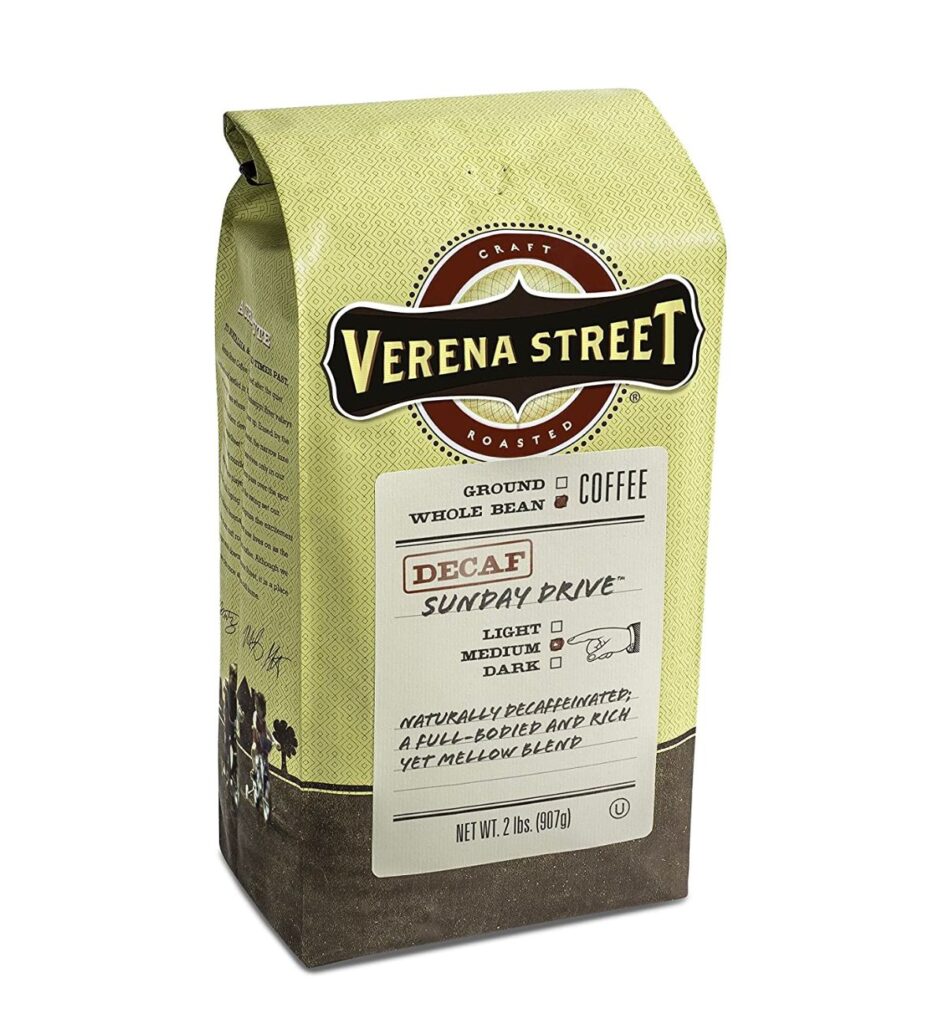
First of all, when it comes to the best decaf coffee for cold brew are all excellent options. These coffees have a deliciously smooth taste that is perfect for enjoying as a cold brew or in any other form. They also promise to deliver a rich flavor without any bitter aftertaste or lack of aroma.
These coffees are decaffeinated using the Swiss Water Process, which ensures minimal caffeine is left behind and no additional chemicals are used. This coffee is a medium roast certified by the Rainforest Alliance. This premium blend of Arabica beans offers a balanced flavor profile with dark chocolate and caramel notes.
Pros
- 100% organic, sustainable, and traceable beans.
- Remove caffeine without using chemicals.
- Rich in antioxidants for health benefits.
- Environmentally friendly packaging made from recycled materials.
Cons
- Higher price than standard decaf coffee beans.
- Potentially more bitter flavor than regular coffee.
Single-origin coffee for cold brew
Wink Coffee Cold Brew Reserve Whole Bean Coffee, 100% Arabica Coffee Beans
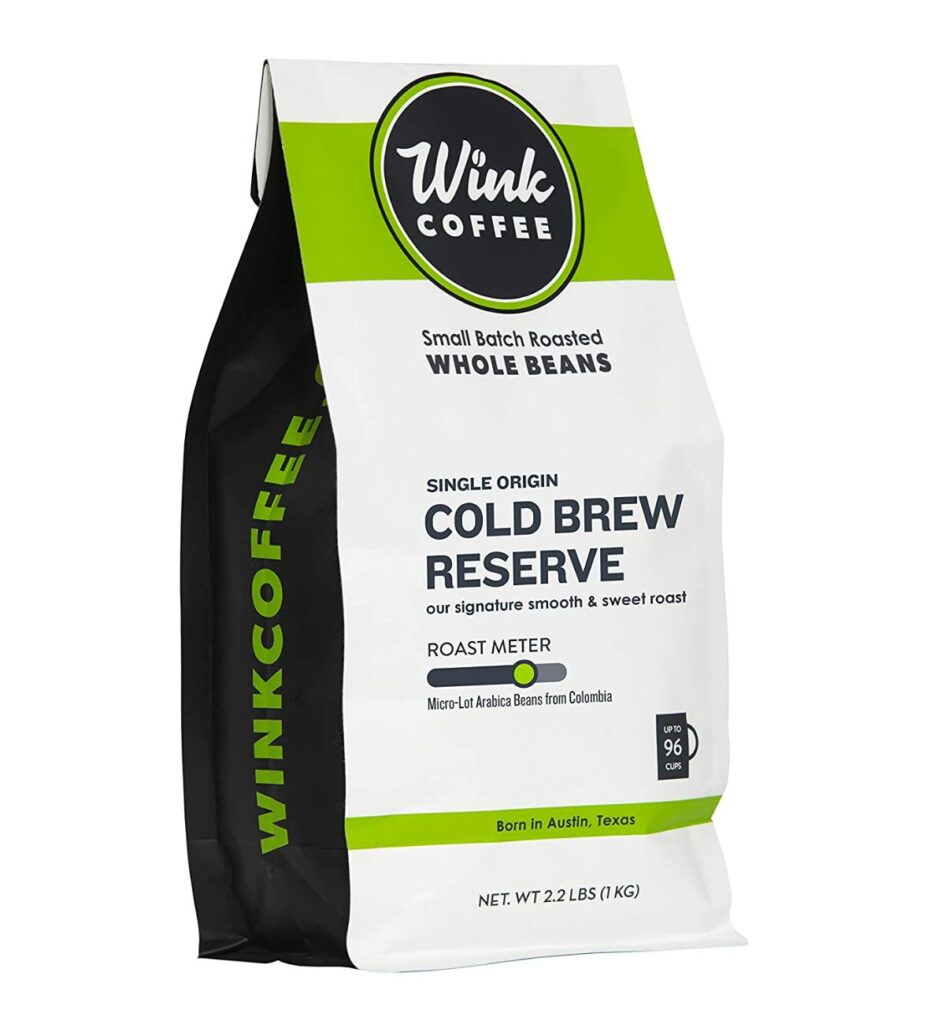
To simplify the process of finding the right cold brew coffee for you, the WINK Coffee Cold Brew is either medium or dark. With the high standards set for the origins of this Colombian single-origin beans. The excellent roasting level will give you the best of both coffee worlds.
With diverse flavors that remind us of sweet pastries, these notes remind us of nutty hazelnut kicks with a touch of caramel in our end cup. If you’re sensitive to bitterness, you may not need extra sugar or syrup to extend the coffee.
Dairy and ketogenic workforces will praise Wink Coffee’s unique new cold brew beverage. The sachet’s large size also causes it to be a one-time investment in your cabinet, even if you prefer to grab a cold brew throughout the day.
Pros
- 100% Arabica beans are used.
- Whole bean coffee offers the freshest flavor possible.
- Single origin ensures consistent quality.
- Cold brew method delivers a highly concentrated flavor extraction.
Cons
- Limited availability of single-origin beans can make sourcing difficult.
- Limited to pre-ground beans
- Not suitable for those with sensitive palates.
Best organic coffee for cold brew
Tiny Footprint Coffee USDA Organic Cold Brew & Press Elixir
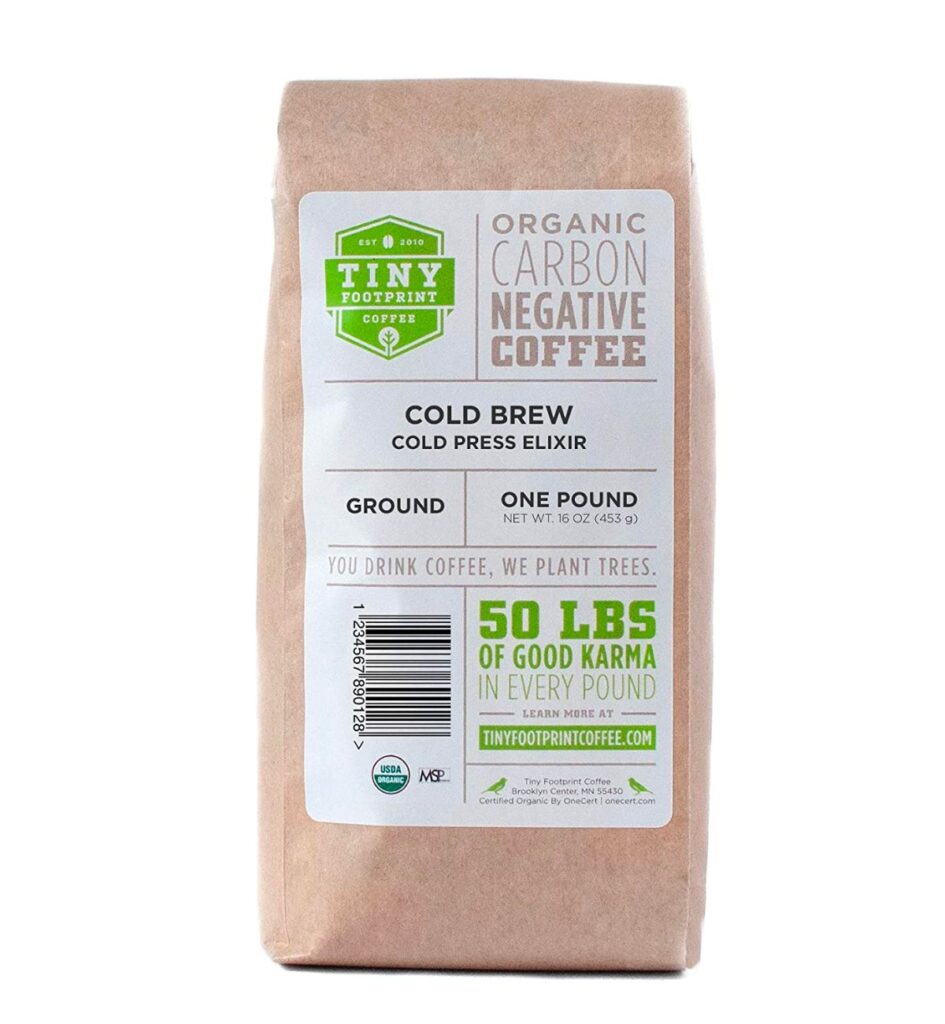
Tiny Footprint’s Cold Press Elixir coffee is the perfect blend for your favorite cold-brew drink. But this is not any old coffee. They’re using shade-grown and organic-certified beans to ensure you’re getting the best possible flavor with each cup. And Cold Press Elixir is specially created to brew cold-filtered cold brew.
Because they are called Tiny Footprint, The roasteries work quite hard to minimize their environmental impact. From providing compost turns in coffee shops to supplying energy-efficient burners for their coffee roasters, these small foot-prints offer as much as possible.
Aside from its great taste, coffee is also good in terms of its environmental impact because it uses renewable resources and is propagated through natural means. In addition to being sweet, rich, and smooth, it has subtle flavors of fruit and floral tones. But what really makes this coffee shop stand out is its commitment to sustainability. So give it a try.
Pros
- USDA-certified organic.
- Carbon negative – helps reduce your carbon footprint.
- Fair Trade certified.
- Supports sustainable farming practices.
Cons
- Price is higher than non-organic products.
- Limited availability due to small production size.
- Not available in decaf options.
Best cheap coffee for cold brew
Cold Brew Organic Coarse Ground Coffee, Colombian Supremo
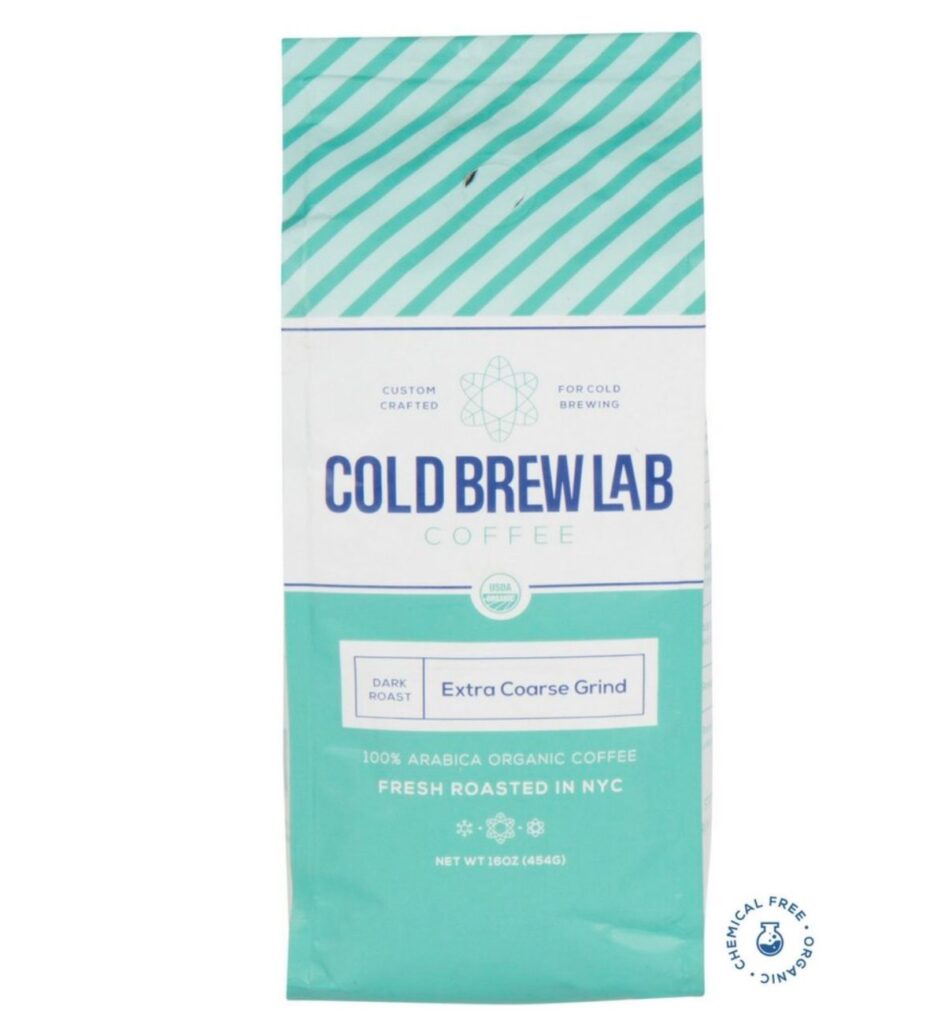
Cold Brew Organic is the best and most affordable choice for cold brew coffee. Its robust dark roast brings out a nutty and sweet flavor with low acidity, making it the perfect daily brew. This coarse grind for cold brew is ground specifically for cold brewing, allowing you to produce a smooth and strong cup of coffee without any bitterness or over-extraction.
The Colombian Supremo beans are sustainably sourced from small family-owned farms in Colombia, resulting in coffee that is high quality and full of flavor. Due to its coarse grind size, it dissolves easily into water, making it quick and easy to make.
Pros
- Coarse ground for a smoother flavor.
- Dark roast provides a bold and complex finish.
- Ideal for making cold brew, which is less acidic.
Cons
- Stronger than usual, so it may not suit all palates.
- Grind size is too large to use in traditional coffee.
Our pick of the best coffee for cold brew
Coffee Bros., Cold Brew Blend – Whole Bean – 100% Arabica
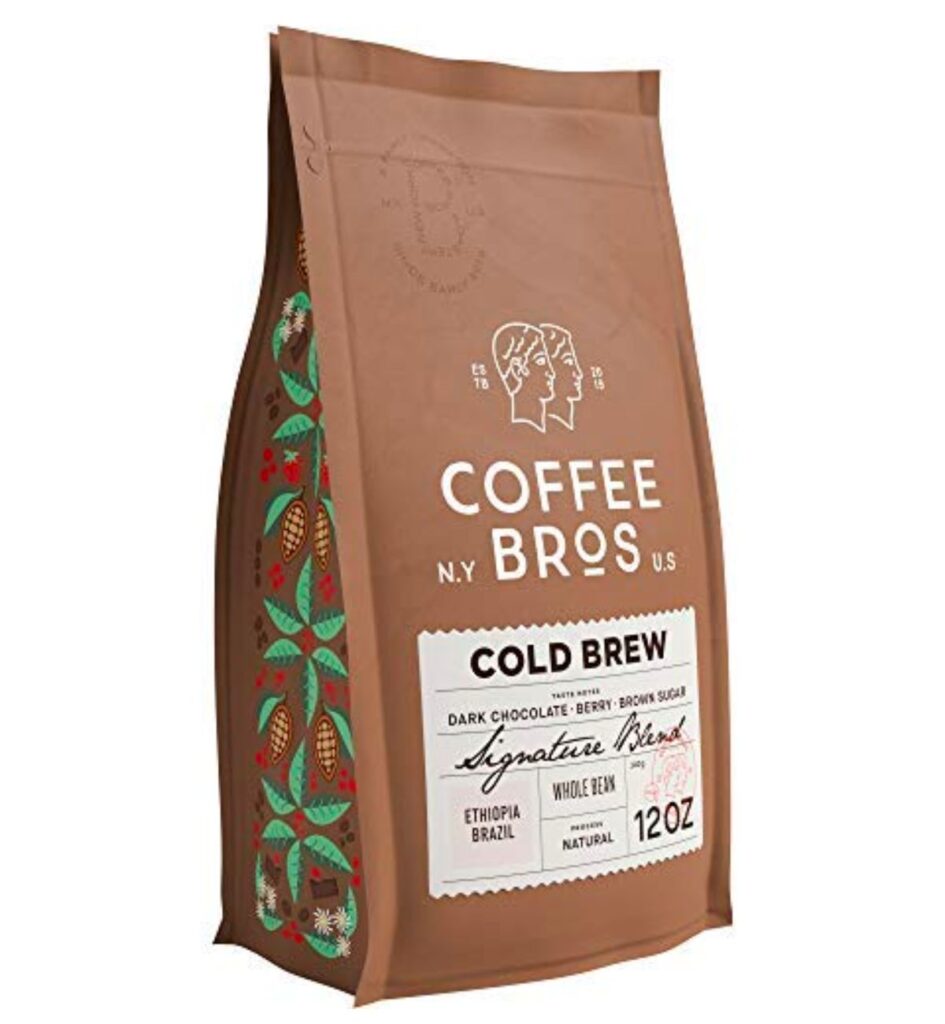
Coffee Bros., a company, was founded by two brothers with a passion for high-quality coffee. They utilize a variety of high-quality sources and shy away from large-scale production, ensuring that each roast receives the attention it deserves.
Their medium roast Cold Brew Blend is handcrafted to highlight the sweet and juicy flavors you want in a refreshing cold brew. It starts with a blend of beans from two of the world’s premier growing regions, Minas Gerais, Brazil, and Yirgacheffe, Ethiopia.
They choose naturally processed beans, which have greater inherent sweetness, and roast them carefully to highlight this character. The resulting beverage is smooth, with a bittersweet flavor reminiscent of chocolate, berry, and brown sugar.
Pros
- Medium roast provides a balanced taste and aroma.
- Bag offers enough coffee for multiple servings.
- Gourmet quality ensures a high-end drinking experience.
- Cold brew blend makes for a refreshing cup.
Cons
- Not pre-ground.
- No decaf option is available in this blend.
- It can be too strong for those sensitive to caffeine.
Cold Brew Methods
Cold brew coffee is a popular method of coffee brewing in which ground coffee is steeped in water at room temperature or cold for an extended period of time, typically between 12-24 hours.
Cold brew provides a smoother, less acidic taste than hot brewed coffee, resulting in a much more enjoyable cup of java. While hot coffee can be brewed quickly in just a few minutes, the process for cold brew takes significantly longer and requires some advanced preparation.
To make the best cup of cold brew, choose the right coffee beans and grind them correctly. Generally speaking, lighter roast coffees work best for cold brew because they keep more flavor intact when stepped over long periods—and they also don’t come out too bitter as darker roasts may.
To bring out the most flavor from your beans when making cold brew, use coarsely ground beans and adjust your grind accordingly if your cold brewer requires different sizes (such as French press). It’s also important to remember that with longer brewing times comes more extraction from the ground beans, so be sure to leave the powder out during this process, or you’ll wind up with bitter-tasting beverages.
For those who are looking for even more flavor without sacrificing smoothness, you can use different additives when making your cold brews. Such as cocoa powder or flavored syrups/extracts—but make sure it’s something that will blend well with cold liquids, or else you could end up tasting an odd mixture of notes.
If you plan on adding any sweeteners like honey or sugar to your drink, adding these first before straining will help ensure that all ingredients get properly mixed and prevent you from having unpleasant aftertastes!
Benefits of Cold Brew Coffee
Cold brew coffee is becoming increasingly popular as a convenient and cost-effective way to enjoy a delicious cup of java. When it comes to choosing the right coffee for cold brewing, there are several factors to consider.
Cold brewing has several benefits over traditional hot-brew methods. Because coffee grounds are steeped in cold water for an extended period of time, the final product has a lower acidity than hot brews. This makes it easier for those who have trouble digesting acidic drinks like regular brewed coffee. Cold brewing also helps to bring out more flavorful notes from your beans and can create a smoother, more balanced cup that those with sensitive palates may prefer. Additionally, cold-brewed coffees tend to last longer than their hot-brewed counterparts because their flavors do not deteriorate like when stored at room temperature.
When choosing a type of coffee beans for cold brews, you will want to select a medium or medium-dark roast with low acidity and good body — like those found in the Central and South American varieties like Colombian or Guatemalan. The grind should be coarse so that your final product isn’t overly bitter or acidic; if you don’t have access to freshly ground beans, then use pre-ground black arabica bean coffee for the best results. Finally, one important element is freshness — you’ll want to find high-quality beans that have been recently roasted within the last week or two for optimal flavor and body.
Grinding and Brewing Techniques
Grinding and brewing techniques for cold brew coffee differ from those used for hot coffee. When making a regular cup of joe, the key is to extract as much flavor from the beans as possible by shocking them with rapid-fire heat. Cold brew requires patience because its goal is to keep the chemical makeup of the beans in a state that won’t create bitter notes or too much acidity.
The two most popular grinding methods for cold brew are burr and blade grinders. Burr grinders help to ensure even results in every batch of coffee. They also provide more control than blade grinders, allowing you to achieve finer grind sizes without creating powdery dust that can over-extract bitterness or acidic flavors.
Brewing techniques can also vary depending on your desired strength, using either full immersion in a prolonged steep time or drip-brewed with cold or room-temperature water over an extended period. Coffee grounds should be soft to the touch without any hard pieces and should have the consistency of sea salt when ready.
Additionally, different filter types can make a difference in your final product, so consider using cotton filters with paper filters as a backup if you plan on reproducing batches often. If you’re looking to experiment and get creative with your cold brews, consider adding spices, different kinds of milk/creams, and sugars for variations in flavor profiles that set apart your home cold brew recipes from those found at cafes and shops.
Tips for Making Cold Brew at Home
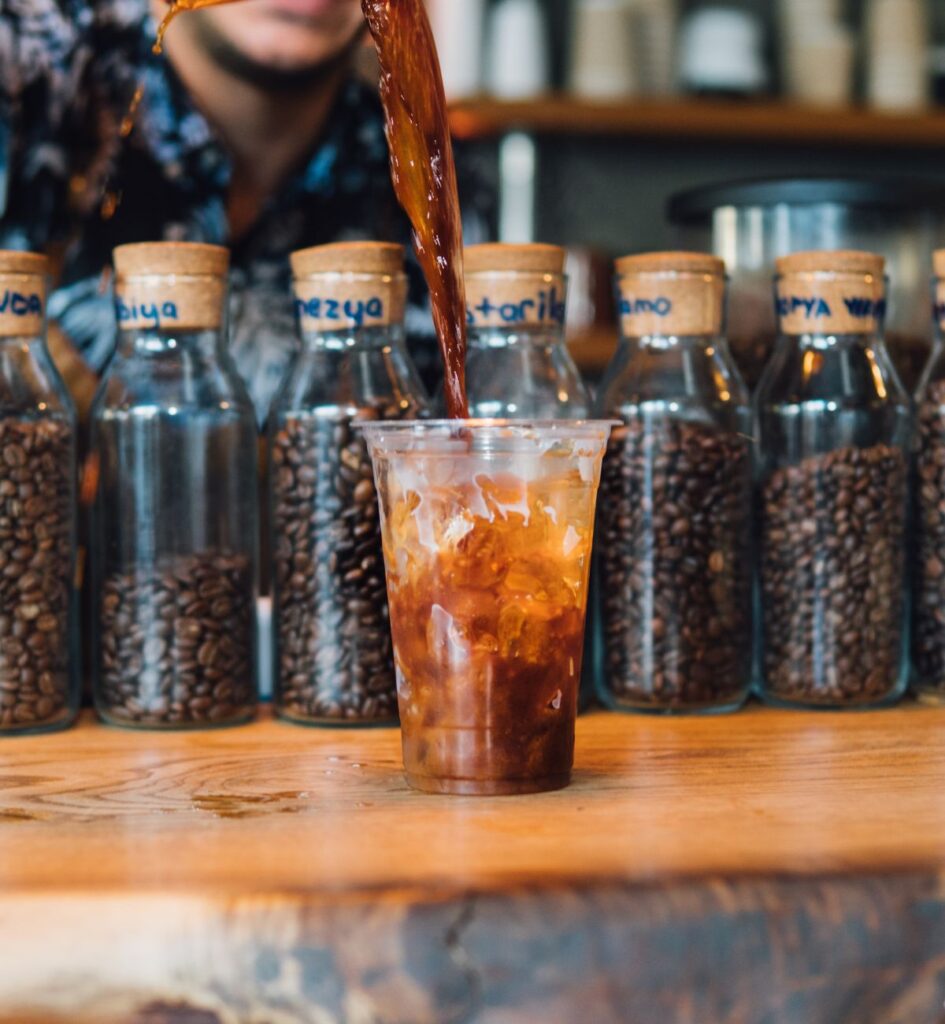
Making cold brew coffee at home is a great way to keep yourself stocked with your favorite caffeinated drink without having to make the trek out to a coffee shop. Cold brew has become increasingly popular in recent years due to its smooth, rich flavor and low acidity, making it easy on the stomach. Here are some tips for making cold brew at home so you can enjoy the perfect cup of joe day after day.
1. Choose Your Coffee: Start by selecting your favorite type of coffee beans, such as light, medium, or dark roast. Generally, a medium-coarse grind will be best for making cold brew; however, if your coffee is too coarse, it may be under-extracted and lack flavor. Experiment with different grind sizes until you find what works best for you!
2. Use Water Wisely: When preparing the water-to-coffee ratio, use a 1:8 ratio (for example, 1 cup of grounds to 8 cups of water). This ratio ensures that your cold brew is not watered down while keeping its bold flavor. For a stronger cold brew, try using less water or more grounds to make it stronger or bolder in flavor.
3. Time It Right: Depending on how strong you want your chill beverage and the type of bean used will determine how long you should allow the immersion process to take place before filtering out the grounds as they infuse into the water solution. Generally speaking, lighter roasts should be immersed between 12-15 hours, while a dark roast could take up to 24 hours or more free infusion time before being strained out.
4. Have Fun Experimenting!: As with anything new, getting creative and customizing flavors can bring something special – maybe by using almond milk instead of plain water – or even adding spices like cocoa powder for an extra kick! Have fun creating different taste experiences until you find what works best for your palate preferences!
Can you use any coffee for cold brew?
When it comes to cold brew coffee, you can use just about any kind of coffee bean that you like. However, certain types of beans might be more suitable for this brewing method. For example, medium-roast or dark-roast blends work best for a cold brew as they impart a stronger flavor that can stand up to the longer steep time.
Blends with a well-rounded flavor profile can also create a richer and smoother cold brew. A light-medium roast blend will be ideal if you’re looking for something slightly sweet and nutty in flavor. Keep in mind that regardless of the roast or the blend, freshness is key. For maximum flavor extraction, always opt for freshly roasted beans that are ground just before brewing.
Buyer Guide on buying the Best coffee for cold brew
Choosing the right type of coffee for cold brew can be tricky, as each roast will result in a different flavor and caffeine concentration. Ensuring the highest quality and purchasing specialty-grade and consistent beans are important.
When making cold brew coffee, there are three main factors to consider when choosing beans: origin, roast, and grind. Origin refers to the country from which the coffee is sourced; roast determines the depth of flavor and acidity; and grind indicates how much exposure the coffee grounds will have to water during extraction. Depending on your preferences, you may choose any combination of these three variables that suits you best.
Origin: While many cold brew recipes include blended coffees from multiple origins for a richer flavor profile, some prefer single-origin beans. Arabica beans from Columbia tend to have sweet notes of brown sugar and cocoa; those from Ethiopia have bright citrus notes with exotic hints of blueberry or jasmine; while coffees from Sumatra are known for bold earthy flavors with deep chocolaty undertones.
Roast: Light-roasted coffee is usually preferred for cold brewing as it produces a sweeter cup with more floral notes than dark roasts. However, dark roasts can produce full-bodied cups with nicotine-like qualities or even smoky or caramelized notes when used correctly in cold brew recipes due to their higher caffeine content.
Grind: Coarse ground coffee is usually preferred over finer grinds since it takes longer for water to penetrate through coarsely ground particles which help produce a smooth texture without any harshness or tannins that might be present in finely ground beans.
Overall, selecting good specialty-grade coffee produced by reputed brands increases your chances of getting consistent quality—which enhances every cup you make!
Conclusion
Overall, the best coffee for cold brew will depend on your personal preferences. Most people prefer a medium-dark or dark roast for cold brew since these roasts are smooth and will not produce a bitter cup of coffee. The beans you choose should also correspond to your preferred brewing method – if you’re making a cold brew with a French press, use coarsely ground beans. If you’re using an immersion brewer, medium to fine grounds work best. Lastly, experiment and find the beans that produce the flavor profile you’re looking for in your cold brew.
